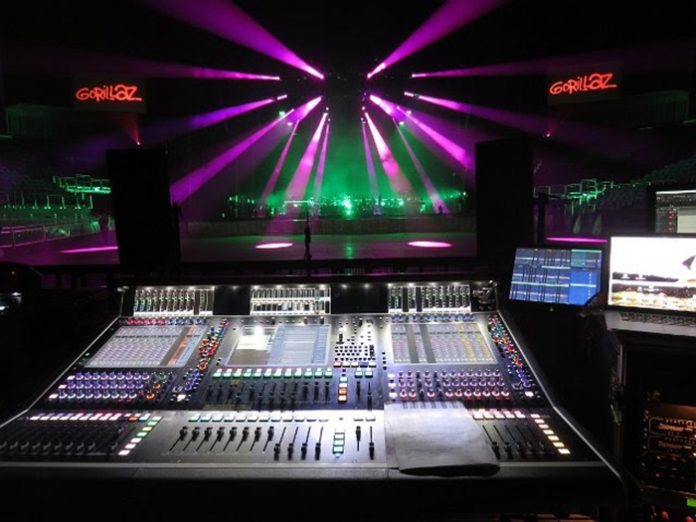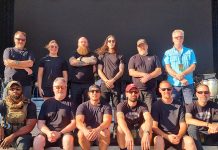In addition to the band’s benchmark animation, Gorillaz are often more than 20-strong on the road. The responsibility of sound was left in the hands of Matt Butcher at FOH and Dave Guerin at monitors, both of whom relied on DiGiCo consoles.
“I started with Damon [Albarn] after Parklife came out, so we go back a long way,” Butcher said. “Right at beginning of the year, for pre-production, we wanted to not compromise on any of the audio – and that’s the way to go: don’t mess around, do it right. Because I’ve known Damon for so long, I can get quite involved, so I can suggest things he should try – it’s quite good leverage, because we have a good understanding of how each other works.”
The FOH and monitor consoles – both DiGiCo SD7s – were maxed out, plus there was an SD11B deployed for the shout system. “The SD11B is also there for monitoring for the playback and the keys tech,” Butcher continued. “He can monitor off the Optoloop rather than the submix of something, so he can see all the individual channels off the Optoloop. Furthermore, we have a [Waves] LV1 which the RF guy uses to monitor all his RF; that’s on a patch from the SD11 to get the channels to him.”
“We use the chat feature on the SD11 a lot, and with [RF engineer] Andy, too,” added Guerin. “And having RF on the same loop means we can all text chat during the show, which is really useful, as in the middle of the gig you can’t always hear what everyone’s shouting.”
The stage was equally as packed as the mixing consoles. In addition to Albarn on guitar and grand piano, there was a drummer, a percussionist, a bassist, guitarist, 2 keys players, 6 BVs and, for the London show, 5 brass and a 5-piece string section.
“Since Demon Days, it’s got a lot bigger,” Butcher admitted. “Damon has plenty of ambitious ideas about what he wants in the band, which is great, but very challenging. But it does mean we get amazing people playing, and with that, some amazing textures.”
Every show was recorded using 128 inputs and a DiGiGrid MGB running off 2 MADI streams at 48kHz. The two engineers said it wouldn’t have been possible without the SD7s. “It’s the best – and probably only – control surface to do something like this on,” Butcher insisted. “The symmetry of the SD7 means you can have a left bank, a right bank, and a bank in the middle; that means you can be doing 3 things at once. I have instruments on the left, vocals on the right, and mixing VCAs in the middle; then the small faders just as FX keys. We are running 8 radio mics, and doubling them up into individual channels for guest artists, so individual artists get their own channel, and you don’t have to worry. Then I keep the automation to some sensible level.”
“With this sort of sized show, we have to be on top of things,” Butcher continued. “Dave writes the spec, and we all add to it. Rack-wise, we have 3 SD racks and 1 [DiGiCo] Orange Box, and that’s got 2 MADI outs – it is the digital in for the keys and tracks, and sends for record. So we’re patched for that as well.
“I’m also running a Waves SoundGrid package on an external rack, but I love a lot of the internal stuff, too; I love the dynamics and multiband compressor on the SD7, and I am using the Waves stuff for things like distorted snares, a gated fuzzbox with reverbs… basically all the daft stuff! And again, through the course of mixing Gorillaz, we have always had a go at doing some dub stuff to make it exciting, and get more involved in the whole sonic thing.”
Guerin also used much of the internal processing within the SD7, concluding: “I have a couple of Distressors, which are great for limiting vocals, then everything else is coming from the console, and all the FX and processing is great. I’ve got 30 stereo mixes and 20 monos: all the ears are stereo, the sidefills and front wedges are stereo, and you can do BVs left, right, and front, and Damon’s vocal sits in the middle. Everything sounds better in stereo, and it gives him that bit more space, too.”






